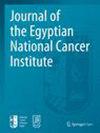代谢综合征与乳腺癌风险
IF 2.1
Q3 ONCOLOGY
Journal of the Egyptian National Cancer Institute
Pub Date : 2023-12-21
DOI:10.1186/s43046-023-00203-1
引用次数: 0
摘要
在埃及,有关代谢综合征及其与乳腺癌风险关系的数据十分有限。我们旨在研究代谢综合征及其作为乳腺癌风险的各个组成部分。这项病例对照研究从阿苏特大学招募了 112 名乳腺癌病例和 112 名年龄匹配的对照者。除了人口统计学、临床和人种学特征外,研究人员还采集了两组研究对象的血液样本,以评估代谢综合征及其各个组成部分。乳腺癌病例组和对照组的平均年龄分别为 46.10 ± 4.34 岁和 45.66 ± 4.68 岁。根据代谢综合征临床诊断联合临时声明(JIS)标准,所有参与者的代谢综合征总患病率为 42.9%,乳腺癌病例组和对照组的患病率分别为 57.14% 和 28.6%,OR 为 33.33,95% CI 为 (1.91-5.81)。乳腺癌患者的体重指数更高,且呈线性趋势,P < 0.001。就代谢综合征的各个组成部分而言,与对照组相比,乳腺癌患者更容易出现空腹血糖水平高、收缩压和/或舒张压高、甘油三酯水平高和高密度脂蛋白胆固醇低的情况。研究发现,代谢综合征及其组成部分与乳腺癌的发病风险有关。我们相信,通过提高社区对改变生活方式的认识来预防或逆转代谢综合征,可以有效地减少该疾病的危害。本文章由计算机程序翻译,如有差异,请以英文原文为准。
Metabolic syndrome and breast cancer risk
Limited data are available on metabolic syndrome and its relation to breast cancer risk in Egypt. We aimed to study metabolic syndrome and its individual components as risk of breast cancer. This case–control study recruited 112 breast cancer cases and 112 age-matched controls from Assiut University. In addition to demographic, clinical, and anthropoemetric characteristics, blood samples were collected from both study groups to evaluate metabolic syndrome and its individual components. Mean age of breast cancer cases and control groups was 46.10 ± 4.34 and 45.66 ± 4.68 years, respectively. According to Joint Interim Statement (JIS) criteria for clinical diagnosis of metabolic syndrome, the overall prevalence of metabolic syndrome in all participants was 42.9%, and prevalence in breast cancer cases and control group was 57.14% and 28.6%, respectively, OR 33.33, 95% CI (1.91–5.81). BMI was more likely to be higher in breast cancer patients with a linear trend, p < 0.001. For individual components of metabolic syndrome, breast cancer cases were more likely to have high fasting blood glucose level, systolic and/or diastolic blood pressure, high triglycerides level, and low HDL-C as compared to the control group. Metabolic syndrome and its components were found to be associated with the risk of breast cancer. We believe that prevention or reversal of metabolic syndrome by raising community awareness for lifestyle changes could be an effective way in minimizing the toll of the disease.
求助全文
通过发布文献求助,成功后即可免费获取论文全文。
去求助
来源期刊
CiteScore
3.50
自引率
0.00%
发文量
46
审稿时长
11 weeks
期刊介绍:
As the official publication of the National Cancer Institute, Cairo University, the Journal of the Egyptian National Cancer Institute (JENCI) is an open access peer-reviewed journal that publishes on the latest innovations in oncology and thereby, providing academics and clinicians a leading research platform. JENCI welcomes submissions pertaining to all fields of basic, applied and clinical cancer research. Main topics of interest include: local and systemic anticancer therapy (with specific interest on applied cancer research from developing countries); experimental oncology; early cancer detection; randomized trials (including negatives ones); and key emerging fields of personalized medicine, such as molecular pathology, bioinformatics, and biotechnologies.

 求助内容:
求助内容: 应助结果提醒方式:
应助结果提醒方式:


